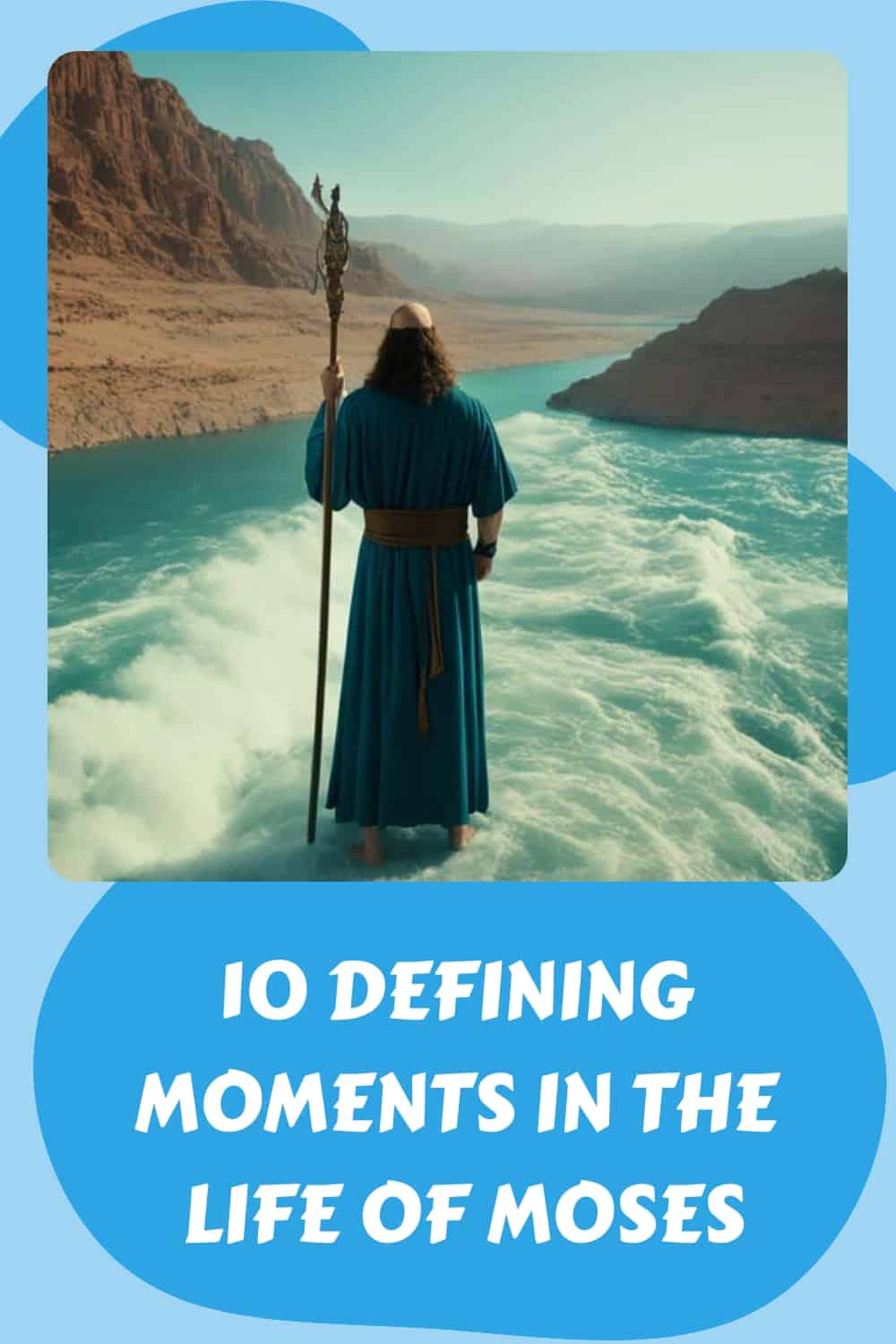Table of Contents
When we think of Moses, we often remember him as the leader who led the Israelites out of Egypt and received the Ten Commandments on Mount Sinai. However, his life was filled with pivotal events that not only defined his journey but also left a lasting impact on his people and the world.
In this article, we will explore the extraordinary life of Moses and delve into those 10 defining moments. From his miraculous survival as an infant to his final view from Mount Nebo, each event played a crucial role in shaping his legacy and strengthening his faith.
Are you ready to uncover the remarkable journey of Moses and discover the events that shaped his life? Join us as we delve into the life of Moses, tracing the path that led him from the Nile’s basket to the awe-inspiring view from Mount Nebo.
Make Sure You Watch The Video: I would love for you to subscribe to my YouTube channel as well… Thanks in advance!!
Birth and Preservation
Moses’ birth and preservation are remarkable examples of God’s providence and protection in the face of great danger.
During a time when Hebrew boys were at risk of being killed, Moses was born to a Levite couple. His mother, Jochebed, concealed him for three months. Fearing for his life, she made a bold decision to place him in a basket and set him afloat on the Nile river, trusting in God’s guidance and protection.
God’s providence was evident as Moses was found by Pharaoh’s daughter, who took compassion on him. She recognized his Hebrew heritage but chose to raise him as her own son, within the palace of Pharaoh.
“And when she opened it, she saw the child, and behold, the baby was crying. She took pity on him and said, ‘This is one of the Hebrews’ children.'” – Exodus 2:6
This pivotal event marked the beginning of God’s plan for Moses. It was in Pharaoh’s household that Moses received an education befitting a future leader, which would ultimately equip him for the tasks God had in store.
| Key Points | Details |
|---|---|
| Perilous Time for Hebrew Boys | Moses’ birth coincided with a time when Hebrew boys were decreed to be killed. |
| God’s Providence | God miraculously preserved Moses’ life by guiding him to be found and raised by Pharaoh’s daughter. |
| Jochebed’s Courage | Moses’ mother, Jochebed, showed great courage by placing him in a basket on the Nile, trusting in God’s protection. |
| Pharaoh’s Compassion | Pharaoh’s daughter took pity on Moses and raised him as her own son, unaware of his Hebrew heritage. |
Burning Bush Encounter
The turning point in Moses’ life occurred during his encounter with God through the burning bush on Mount Horeb. This significant moment shaped Moses’ destiny and set in motion the deliverance of the Israelites from bondage in Egypt.
As Moses was tending his flock near the mountain, he noticed a bush engulfed in flames but not consumed. Intrigued, he approached, and it was there that God revealed His divine presence to Moses.
In awe and reverence, Moses heard the voice of God commanding him to remove his sandals, for he stood on holy ground. In this sacred encounter, God revealed His name, YHWH, symbolizing His eternal existence and divine power.
God then declared His mission for Moses – to lead the Israelites out of Egypt and into the promised land of Canaan. Moses, initially hesitant and doubtful, questioned his ability to fulfill such a monumental task.
“Who am I that I should go to Pharaoh and bring the Israelites out of Egypt?”
– Moses (Exodus 3:11)
God assured Moses of His unwavering presence and guidance throughout this journey. He promised to display His mighty wonders and miracles to convince Pharaoh to release the Israelites.
With this divine commission, Moses emerged as the chosen leader, appointed by God Himself. Through his encounter with the burning bush and the revelation of God’s name, Moses gained the confidence and conviction necessary to embark on the monumental task of deliverance.
This encounter marked the beginning of a transformative chapter in Moses’ life, setting in motion the events that would lead to the liberation of the Israelites and the fulfillment of God’s promises.
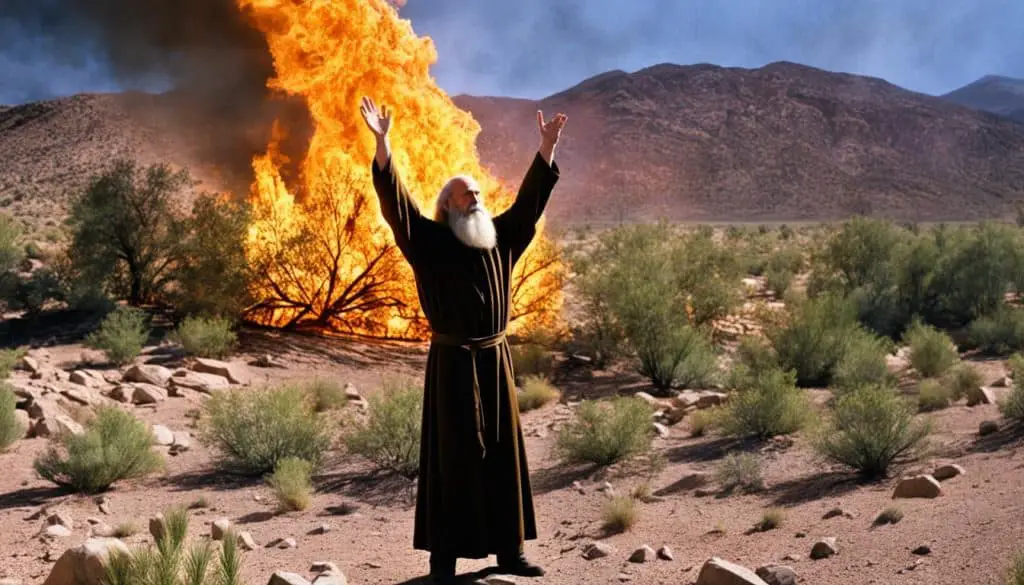
The Significance of Mount Horeb
Mount Horeb, also known as Mount Sinai, holds great significance in biblical history. It was the very place where God revealed Himself to Moses through the burning bush, setting the stage for the deliverance of His people.
At Mount Horeb, Moses experienced a profound encounter with the presence of God. This sacred mountain became a symbol of divine revelation, the starting point of God’s transformative work through Moses.
The name “Horeb” itself signifies the sanctity of this mountain, derived from the Hebrew word meaning “desert” or “waste.” It represents a place of divine encounter amidst the barrenness of the wilderness, a testament to God’s ability to bring forth life and purpose even in the most barren of circumstances.
| Significance of Mount Horeb | Scripture References |
|---|---|
| Revelation of God’s name | Exodus 3:1-15 |
| Commissioning of Moses | Exodus 3:10-12 |
| The starting point of the Exodus | Exodus 12:37 |
Plagues on Egypt
Through Moses, God unleashed ten devastating plagues upon Egypt, showcasing His power over the Egyptian gods and Pharaoh’s stubborn heart. These acts were demonstrations of God’s sovereignty and judgment, ultimately culminating in the liberation of the Israelites.
God’s power was on full display as He systematically struck Egypt with plagues, each more severe than the last. The plagues were not random acts of destruction, but a deliberate expression of God’s sovereignty and judgment over the Egyptian gods and Pharaoh’s obstinacy.
“Say to Aaron, ‘Take your staff and stretch out your hand over the waters of Egypt—over its streams, its rivers, its ponds, and all its reservoirs—and they will become blood. Blood will be everywhere in Egypt, even in the wooden buckets and stone jars.'” – Exodus 7:19 (NIV)
The ten plagues revealed God’s power over Egypt’s false gods and demonstrated His authority to the Israelites and the Egyptians. Each plague targeted a specific Egyptian deity, from turning the Nile into blood to bringing forth swarms of frogs, gnats, and flies.
The plagues increased in severity, with livestock dying, boils afflicting the Egyptians, hail raining down, locusts devouring crops, darkness covering the land, and culminating in the devastating plague of the firstborn.
“On that same night I will pass through Egypt and strike down every firstborn of both people and animals, and I will bring judgment on all the gods of Egypt. I am the LORD.” – Exodus 12:12 (NIV)
Despite the hardships these plagues brought upon Egypt, Pharaoh stubbornly refused to let the Israelites go. His hardened heart and refusal to submit to God’s power only intensified the severity of each plague.
After the final and most devastating plague, the death of the firstborn, Pharaoh finally relented and allowed the Israelites to leave Egypt. The plagues served as a divine judgment on Egypt’s idolatry and a demonstration of God’s power and sovereignty.
The Ten Plagues on Egypt
| Plague | Devastation | Egyptian god(s) challenged |
|---|---|---|
| 1. Water to Blood | All water in Egypt turned into blood | Hapi (god of the Nile) |
| 2. Frogs | Frogs overrun Egypt, covering the land | Heqet (goddess of fertility) |
| 3. Gnats | Gnats swarm on humans and animals | Unknown |
| 4. Flies | Flies infest Egypt, multiplying rapidly | Uatchit (fly god) |
| 5. Livestock Plague | Death of all Egyptian livestock | Apis (bull god), Hathor (goddess of motherhood), Ptah (god of craftsmen) |
| 6. Boils | Boils afflict the Egyptians | Sekhmet (goddess of medicine) |
| 7. Hail | Hail destroys crops and kills animals | Nut (goddess of the sky) |
| 8. Locusts | Locusts devour all remaining vegetation | Amon (agriculture god), Min (god of fertility) |
| 9. Darkness | Total darkness over Egypt for three days | Ra (sun god) |
| 10. Death of the Firstborn | Death of the firstborn in every Egyptian household | Pharaoh (regarded as a god) |
Parting of the Red Sea
Facing the Red Sea with the Egyptian army in pursuit, Moses’ faith and obedience to God led to the miraculous parting of the waters. This event not only provided a safe passage for the Israelites but also marked a powerful demonstration of God’s intervention.
“And Moses stretched out his hand over the sea; and the Lord caused the sea to go back by a strong east wind all that night, and made the sea dry land, and the waters were divided.” – Exodus 14:21
This extraordinary moment of divine intervention showcased Moses’ unwavering trust in God as he followed His instructions to raise his staff. As the waters miraculously parted, the Israelites were granted a path through the sea, granting them a safe passage while the pursuing Egyptian army was engulfed by the returning waters.
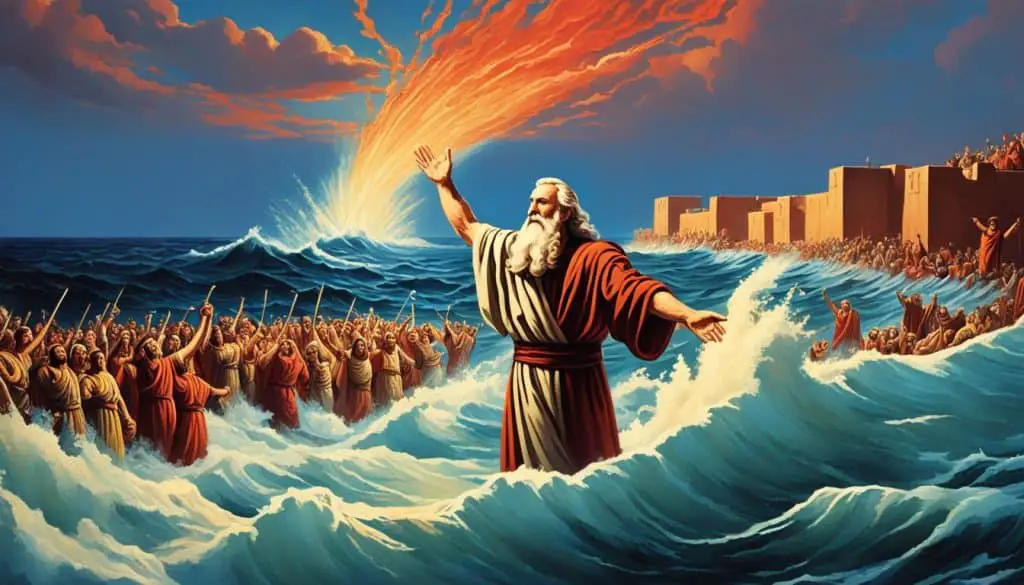
The Red Sea event served as a profound testament to the power of faith and obedience, solidifying Moses’ role as the chosen leader of God’s people. Through this miraculous intervention, God protected and guided the Israelites towards their journey to the promised land.
The Impact and Significance
The parting of the Red Sea stands as one of the most remarkable and memorable events in biblical history. It not only showcased God’s supernatural power and control over nature but also symbolized His commitment to deliver and protect His people.
Table: The Miraculous Events in the Exodus Journey
| Miraculous Event | Description |
|---|---|
| Plagues on Egypt | God’s display of power and judgment to secure the liberation of the Israelites. |
| Parting of the Red Sea | The miraculous division of the Red Sea, providing a safe passage for the Israelites. |
| Crossing the Wilderness | God’s continuous provision of food, water, and guidance throughout the arduous journey. |
As the Israelites experienced this incredible event firsthand, their faith in God and in Moses as their leader grew exponentially. The parting of the Red Sea became a defining moment, demonstrating God’s faithfulness and the importance of trusting in His plans.
Covenant at Mount Sinai
At Mount Sinai, Moses received a divine revelation that would shape the course of history—the Ten Commandments. This pivotal event marked the establishment of a covenant between God and the Israelites, solidifying Moses’ role as the mediator of this sacred agreement.
The Ten Commandments, given directly by God, served as the foundation of moral and ethical principles for the Israelite community. These commandments encompassed various aspects of human behavior, from honoring the Sabbath to refraining from murder, theft, and adultery. The divine origin of these laws underscored their timeless significance and provided a guide for righteous living.
In receiving the Ten Commandments, Moses became the intermediary between God and the Israelites, serving as the conduit for God’s will and the interpreter of His laws. His role as a mediator allowed him to bridge the gap between the divine and the human, ensuring that the covenant was upheld and followed by the people.
The covenant at Mount Sinai not only established the moral and ethical framework for the Israelite community but also emphasized the importance of obedience and fidelity to God’s commandments. It set the stage for the Israelites’ journey to the promised land, serving as a constant reminder of their unique relationship with God and their responsibilities as His chosen people.
| Key Aspects of the Covenant at Mount Sinai | Significance |
|---|---|
| Receiving the Ten Commandments | Provided a clear set of moral and ethical guidelines for the Israelites. |
| Moses as the Mediator | Established Moses as the intermediary between God and the people, ensuring the covenant’s implementation and interpretation. |
| Divine Origin of the Law | Emphasized the timeless significance and authority of the commandments given directly by God. |
| Obedience and Fidelity | Highlighted the importance of adhering to the commandments as a demonstration of faith and commitment to God. |

The covenant at Mount Sinai stands as a testament to the profound encounter between Moses and God. It serves as a reminder of the divine guidance and the shared responsibility between God and His people, showcasing the transformative power of obedience and adherence to His commandments.
The Golden Calf
While Moses was on Mount Sinai, he left the Israelites in the care of Aaron, his brother and a trusted companion. However, during Moses’ absence, the Israelites succumbed to their impatience and fear, turning to idolatry and crafting a golden calf to worship.
This event posed a significant test of faith for both the Israelites and Moses. The Israelites had recently been liberated from Egypt and had witnessed countless miracles along their journey, yet they chose to abandon their trust in God. Additionally, for Moses, it was a moment of tremendous disappointment and heartbreak to witness the chosen people’s betrayal of divine guidance.
Moses, being a true leader, interceded on behalf of the Israelites before God. His unwavering commitment to God and his role as their leader prompted him to stand up for them, seeking God’s mercy and forgiveness despite their grave transgressions. Moses’ intercession demonstrated his love for his people and his dedication to their spiritual well-being.
In Exodus 32:30-34, Moses pleads with God, saying:
“But now, please forgive their sin—but if not, then blot me out of the book you have written.”
This plea showcases Moses’ selflessness and willingness to take the burden and consequences of his people’s actions upon himself. His intercession highlights not only his role as a mediator between God and the Israelites but also his compassion and desire for their redemption.
The incident of the golden calf reflects the moral struggles and imperfections of humanity, reminding us of the complexities of faith and the propensity to falter under challenging circumstances. Yet, it also serves as a lesson in divine forgiveness and the power of intercession to bridge the gap between God and His people.
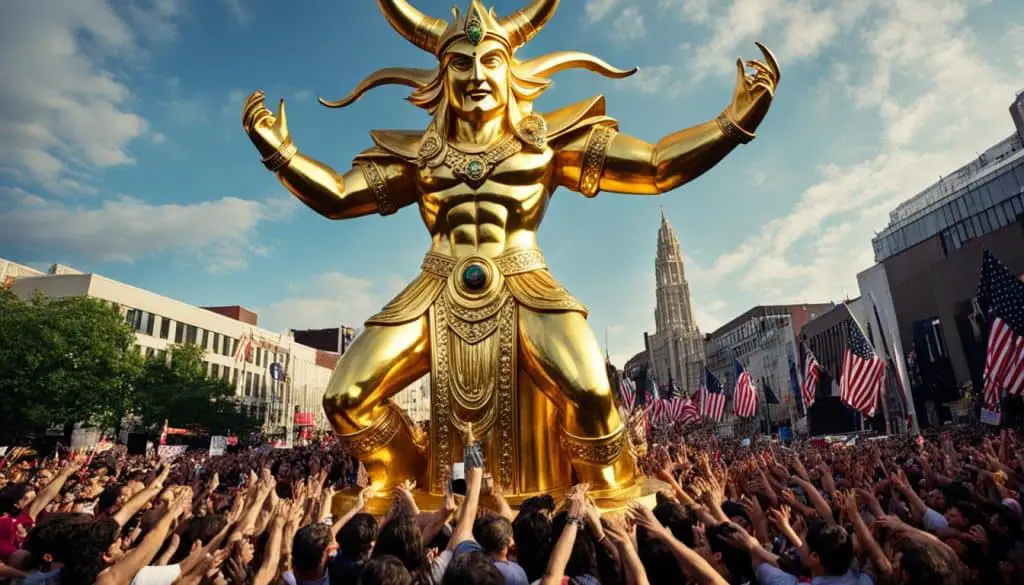
| Key Points | Details |
|---|---|
| Event | The worship of the golden calf |
| Location | Mount Sinai |
| Participants | The Israelites, Aaron |
| Test of Faith | Choosing idolatry over trust in God |
| Leadership | Moses’ intercession on behalf of the people |
Provision in the Wilderness
As Moses led the Israelites through the wilderness, he witnessed the remarkable miracles of God’s provision, demonstrating His unwavering care and sustenance for His people.
One of the most striking examples of this provision was the gift of manna from heaven. Each day, the Israelites woke up to find a miraculous bread-like substance covering the ground. They were instructed to gather enough for their daily sustenance, with the exception of the Sabbath when they gathered double the amount. This heavenly sustenance sustained the Israelites throughout their journey, reminding them of God’s faithful provision.
Additionally, when the Israelites faced a dire shortage of water, Moses found himself once again in a position to witness God’s miraculous provision. In response to the people’s thirst, God commanded Moses to strike a rock with his staff, and water gushed forth, quenching the thirst of the entire community. This powerful act of God’s care not only satisfied their immediate need but also served as a tangible reminder of His continuous guidance and provision.
Through these extraordinary events, Moses experienced firsthand the unwavering love and sustenance of the Almighty. The wilderness proved to be a testing ground for the Israelites’ faith and a profound testament to God’s unfailing care.
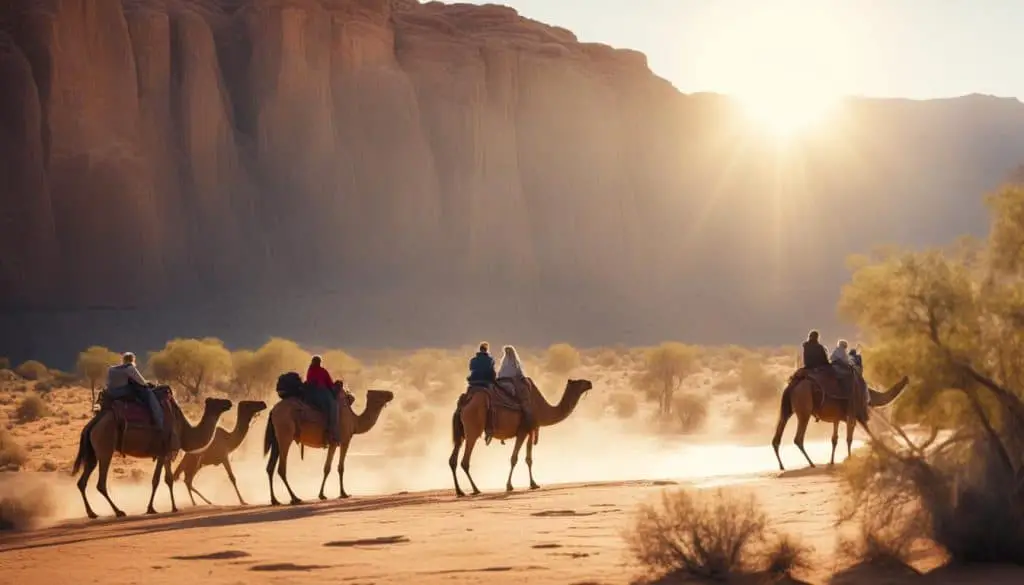
The Miracles of Provision in the Wilderness
| Event | Description |
|---|---|
| Manna from Heaven | God provided daily sustenance in the form of bread-like substance |
| Water from the Rock | Moses struck a rock, and water gushed forth to quench the people’s thirst |
| Cloud and Pillar of Fire | God guided the Israelites through the wilderness with a cloud by day and a pillar of fire by night |
| Protection from Enemies | God kept the Israelites safe from their enemies, providing divine intervention in battles |
How Did Moses’ Defining Moments Compare to Those of Samson?
Moses’ defining moments centered around faith and leadership, while Samson’s defining moments revolved around his physical strength and moral weaknesses. Both exhibited extraordinary power, but Moses led his people with wisdom, while Samson’s strength was ultimately his downfall due to his moral weaknesses.
View from Mount Nebo
As Moses reached the end of his incredible journey, he stood on Mount Nebo, overlooking the promised land. This vantage point symbolized the culmination of his faith, leadership, and unwavering commitment to God’s promises and purposes.
From the top of Mount Nebo, Moses gazed upon the land flowing with milk and honey, the fulfillment of the divine pledge made to Abraham, Isaac, and Jacob. This view brought immense joy and satisfaction, knowing that the Israelites would soon inherit the land God had promised them.
It was on Mount Nebo that Moses had his final encounter with the Lord. Though he could not enter the promised land himself, he had faithfully guided the Israelites for over forty years, leading them through trials and triumphs. His encounter with God on this mountaintop affirmed his life’s purpose and solidified his legacy as an exemplary leader.
Standing on Mount Nebo, Moses passed on his leadership to Joshua, who would lead the Israelites into the promised land. With firm faith in God’s guidance and promises, Moses entrusted the future of his people to Joshua, knowing that they were in capable hands.


